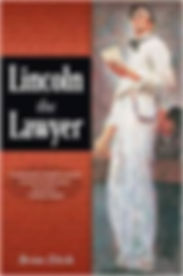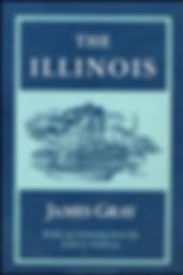Corn Kings and One-Horse Thieves
Odds & ends

Illinois past and present, as seen by James Krohe Jr.
The Corn Latitudes
Harry Was Once a Respectable Newspaperman
1870s columnists set a good bad example
Illinois Times
January 5, 1979
Springfield used to be a great newspaper town, owing mainly to the fact that so many of its citizen were convinced they had political truths worth sharing. The papers themselves also used to be good reading that offered a local model—mock-serious, wise-cracking, often at Springfield's expense—for my own work. In this piece I recall in particular the work of brothers E. L. and J. D. Merritt, who in addition to publishers were authors of a column titled “The City.”
And yes, “obreptitious” is a proper word, meaning done or obtained by trickery or by concealing the truth. A good word to know in a state capital.
On the day before Christmas the Associated Press slowed its furious scribbling about cult massacres and airplane disasters (do cults travel by air, 1 wonder?) long enough to inform us that one Dennis D. Tyrer of Raleigh, North Carolina, has made it his hobby to read old newspapers of North Carolina for insights into 18th- and 19th-century life in that state.
Reading old newspapers is a harmless enough eccentricity, as eccentricities go these days—less obreptitious than evangelism, for instance, (though lacking its tax advantages) and less homicidal than gourmet cooking. 1 know because 1, like Mr. Tyrer, am an old newspaper buff, or rather a buff of old newspapers. Like him 1 developed the addiction in the course of historical research, and like him I have since returned to them often for self-amusement.
I find modern newspapers necessary, of course, and in one or two cases even admirable. But they are seldom enjoyable in the ways that their 19th century counterparts are. Readers looking for humor and nicely-turned phrases now routinely pass up the newsstand on the way to the library.
A few weeks ago a generous reader of this sheet loaned us a bound set (acquired at an auction) of the “Illinois State Register" from January through June of 1872. The “Register” was one of the parents of the infant “State Journal-Register”. The paper was exuberantly Democratic in its politics and waspish—and WASP-ish—in tone.
It was owned and run by the Merritt brothers, E. L. and J. D., who aired their miscellaneous opinions in a daily column called simply, “The City.” I present a few random entries from that space, so you may know what all the shouting’s about.
On education: “A school class in a country school in Macon County is in a condition of uncertainty regarding the composition of component parts of chalk. At an examination one of them thought it was made of snow, another was of the opinion that the ingredients were milk and water, while a third insisted that it was nothing else than petrified Dutch cheese. Number Three was sent to the head. The class takes up astronomy next term.” The item clearly demonstrates that in education at least, not much has changed in 107 years.
On the public health: “No small pox has yet appeared in Springfield. If you still feel uneasy after reading this assurance, go and get vaccinated. If that don’t settle your nerves, get vaccinated again and keep on getting vaccinated until you know you are all right.”
On manners: “The middle-aged bald headed old gentleman who sat down so suddenly upon the sidewalk in front of the Leland Hotel at an early hour this morning, is requested to retain his perpendicular hereafter, until he has broken himself of his terrible habit of profanity, or else do his slipping down and hard swearing in some other locality.”
On public improvements: “A bill is before the general assembly for the improvement of the Sangamon river. A certain well-known dentist of this city has been ‘spoken to’ to go down and remove the old snags from its mouth.”
On life in Springfield: “It is getting so dull that an enterprising citizen, yesterday, had a tooth pulled, to break the monotony.”
On home remedies: “The gentleman who burned sulphur in his cellar as a disinfectant has just had his picture frames regilded. The funeral of his wife’s pet canaries was very touching.”
On the effects of alcohol: “There is a man in the Third ward whose nose is so brilliant that he has to smoke his looking glass before he can see to shave himself.
I regret that space does not allow me to treat you to the “Register's” account of the visit to Springfield of Russia's Grand Duke Alexis, (“In this city we very seldom obtain sight of real live duke”) which was covered by the “Register’s” special correspondent who “went over to the Western Hotel and, looking through the bottom of a glass, endeavored to discover the approaching train.” (He did not get an interview—the train didn’t even stop—but so impressed was he that “the pair of spectacles with which he saw the Grand Duke cannot be purchased at any price.”)
Nor can I delve at length into the "Register’s" pungent opinions about “these country fellows" who occupied editorial rooms in Peoria, Jacksonville and Decatur, or its observations about the local Republicans (“Harry [Watson] was once a respectable newspaperman, and now look at him, trying to get a republican nomination”). Still, one gets the idea. I close with this diatribe against newspaper thieves. (The subject was not, as you may have first assumed, publishers, but people who steal papers off subscribers’ porches.) “Not a spark of manhood or principle pervades his little soul,” the “Register” thundered. “There are few things in this sublunary sphere that so excite the nervous system of a reader as to be cheated out of his daily paper. It completely upsets him, destroys his appetite, disqualifies him for business, making him cross and irritable.”
I can see why. □
SITES
OF
INTEREST
Essential for anyone interested in Illinois history and literature. Hallwas deservedly won the 2018 Lifetime Achievement Award from the Illinois State Historical Society.
One of Illinois’s best, and least-known, writers of his generation. Take note in particular of The Distancers and Road to Nowhere.
See Home Page/Learn/
Resources for a marvelous building database, architecture dictionary, even a city planning graphic novel. Handsome, useful—every Illinois culture website should be so good.
The online version of The Encyclopedia of Chicago. Crammed with thousands of topic entries, biographical sketches, maps and images, it is a reference work unmatched in Illinois.
The Illinois chapter of the American Institute of Architects in 2018 selected 200 Great Places in Illinois that illustrate our shared architectural culture across the entire period of human settlement in Illinois.
A nationally accredited, award-winning project of the McLean County Historical Society whose holdings include more than 20,000 objects, more than 15,000 books on local history and genealogy, and boxes and boxes of historical papers and images.
Mr. Lincoln, Route 66, and Other Highlights of Lincoln, Illinois
Every Illinois town ought to have a chronicler like D. Leigh Henson, Ph.D. Not only Lincoln and the Mother road—the author’s curiosity ranges from cattle baron John Dean Gillett to novelist William Maxwell. An Illinois State Historical Society "Best Web Site of the Year."
Created in 2000, the IDA is a repository for the digital collections of the Illinois State Library and other Illinois libraries and cultural institutions. The holdings include photographs, slides, and glass negatives, oral histories, newspapers, maps, and documents from manuscripts and letters to postcards, posters, and videos.
The people's museum is a treasure house of science and the arts. A research institution of national reputation, the museum maintains four facilities across the state. Their collections in anthropology, fine and decorative arts, botany, zoology, geology, and history are described here. A few museum publications can be obtained here.
“Chronicling Illinois” showcases some of the collections—mostly some 6,000 photographs—from the Illinois history holdings of the Abraham Lincoln Presidential Library.
I will leave it to the authors of this interesting site to describe it. "Chicagology is a study of Chicago history with a focus on the period prior to the Second World War. The purpose of the site is to document common and not so common stories about the City of Chicago as they are discovered."
Illinois Labor History Society
The Illinois Labor History Society seeks to encourage the preservation and study of labor history materials of the Illinois region, and to arouse public interest in the profound significance of the past to the present. Offers books reviews, podcasts, research guides, and the like.
Illinois Migration History 1850-2017
The University of Washington’s America’s Great Migrations Project has compiled migration histories (mostly from the published and unpublished work by UW Professor of History James Gregory) for several states, including Illinois. The site also includes maps and charts and essays about the Great Migration of African Americans to the north, in which Illinois figured importantly.
An interesting resource about the history of one of Illinois’s more interesting places, the Fox Valley of Kendall County. History on the Fox is the work of Roger Matile, an amateur historian of the best sort. Matile’s site is a couple of cuts above the typical buff’s blog. (An entry on the French attempt to cash in on the trade in bison pelts runs more than
2,000 words.)
BOOKS
OF INTEREST

Southern Illinois University Press 2017
A work of solid history, entertainingly told.
Michael Burlingame,
author of Abraham
Lincoln: A Life
One of the ten best books on Illinois history I have read in a decade.
Superior Achievement Award citation, ISHS Awards, 2018
A lively and engaging study . . . an enthralling narrative.
James Edstrom
The Annals of Iowa
A book that merits the attention of all Illinois historians
as well as local historians generally.
John Hoffman
Journal of Illinois HIstory
A model for the kind of detailed and honest history other states and regions could use.
Harold Henderson
Midwestern Microhistory
A fine example of a resurgence of Midwest historical scholarship.
Greg Hall
Journal of the Illinois
State Historical Society
Click here
to buy the book
Southern Illinois University Press
SIU Press is one of the four major university publishing houses in Illinois. Its catalog offers much of local interest, including biographies of Illinois political figures, the history (human and natural) and folklore of southern Illinois, the Civil War and Lincoln, and quality reprints in the Shawnee Classics series.
The U of I Press was founded in 1918. A search of the online catalog (Books/Browse by subject/Illinois) will reveal more than 150 Illinois titles, books on history mostly but also butteflies, nature , painting, poetry and fiction, and more. Of particular note are its Prairie State Books, quality new paperback editions of worthy titles about all parts of Illinois, augmented with scholarly introductions.
The U of C publishing operation is the oldest (1891) and largest university press in Illinois. Its reach is international, but it has not neglected its own neighborhood. Any good Illinois library will include dozens of titles about Chicago and Illinois from Fort Dearborn to
Vivian Maier.
Northern Illinois University Press
The newest (1965) and the smallest of the university presses with an interest in Illinois, Northern Illinois University Press gave us important titles such as the standard one-volume history of the state (Biles' Illinois:
A History of the Land and Its People) and contributions to the history of Chicago, Illinois transportation, and the Civil War. Now an imprint of Cornell University Press.




Reviews and significant mentions by James Krohe Jr. of more than 50 Illinois books, arranged in alphabetical order
by book title.
Run by the Illinois State Library, The Center promotes reading, writing and author programs meant to honor the state's rich literary heritage. An affiliate of the Library of Congress’s Center for the Book, the site offers award competitions, a directory of Illinois authors, literary landmarks, and reading programs.
